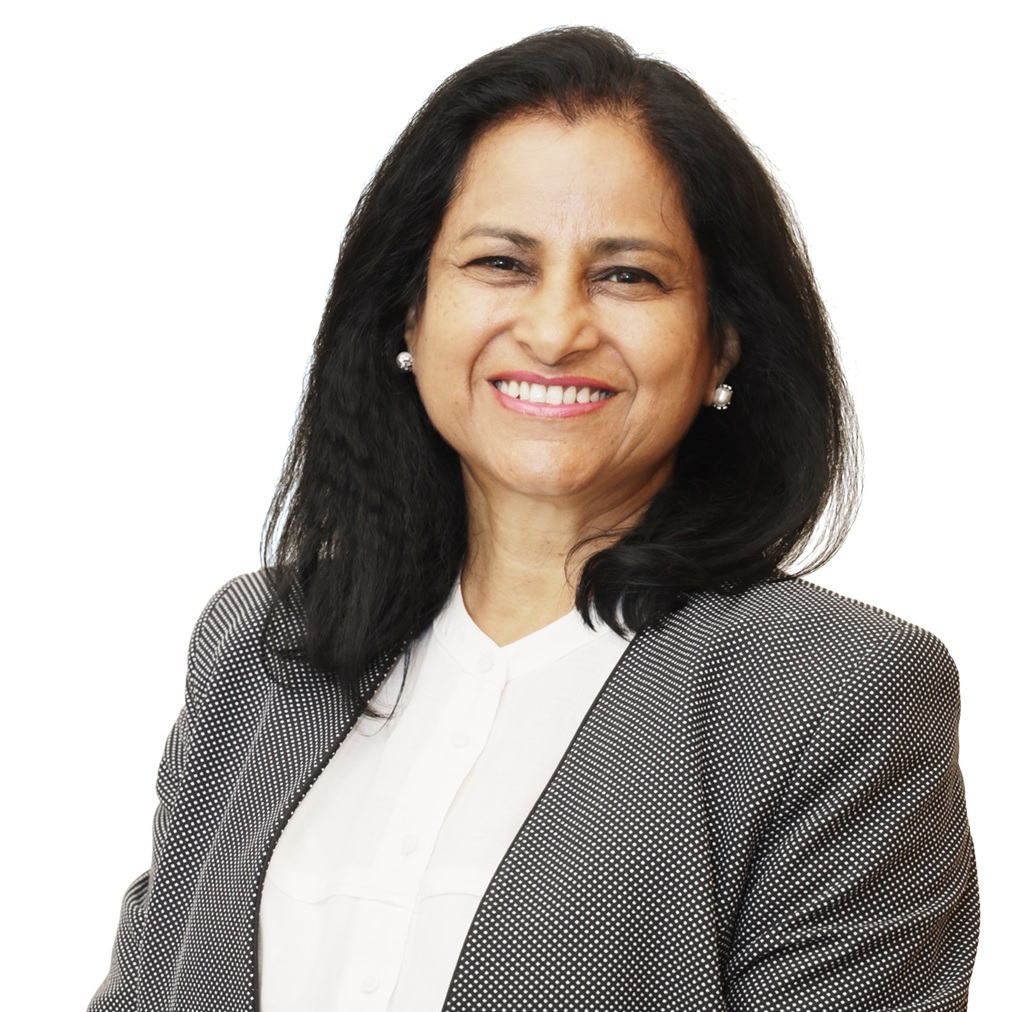 Quality education and effective learning are fundamental to unlocking a child's potential and shaping a prosperous future for society. Dr. Sunita Gandhi, Founder of Dignity Education Vision International (DEVI), a not-for-profit organization committed to transforming education, delves into this critical issue in her article "Literacy in 45 Days? How a new FLN program is accelerating learning for all in Uttar Pradesh." She explores the remarkable success of the Accelerating Learning for All (ALfA) program, implemented in the Hilauli block of Uttar Pradesh, which has dramatically improved literacy rates in a short period. Drawing from her extensive experience and research, Dr. Gandhi highlights the innovative teaching methodologies and the significant impact of peer learning, demonstrating how ALfA's approach can revolutionize education and meet the ambitious NIPUN targets.
Quality education and effective learning are fundamental to unlocking a child's potential and shaping a prosperous future for society. Dr. Sunita Gandhi, Founder of Dignity Education Vision International (DEVI), a not-for-profit organization committed to transforming education, delves into this critical issue in her article "Literacy in 45 Days? How a new FLN program is accelerating learning for all in Uttar Pradesh." She explores the remarkable success of the Accelerating Learning for All (ALfA) program, implemented in the Hilauli block of Uttar Pradesh, which has dramatically improved literacy rates in a short period. Drawing from her extensive experience and research, Dr. Gandhi highlights the innovative teaching methodologies and the significant impact of peer learning, demonstrating how ALfA's approach can revolutionize education and meet the ambitious NIPUN targets.
Read the full article for more insights:
Literacy in 45 Days? How a New FLN program is Accelerating Learning For All in Uttar Pradesh
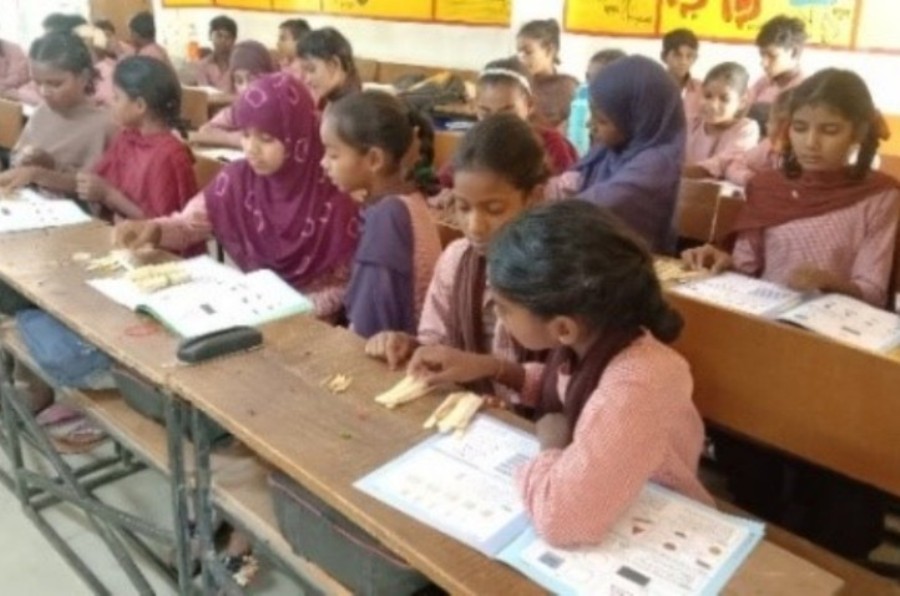 At the end of 2023, the government of Uttar Pradesh conducted the NIPUN Assessment Test across 64,000 schools, measuring the reading, writing, and arithmetic skills of more than 2 million Grade 1-3 students. Across the state, just 24% of schools were deemed to have met NIPUN targets. In Unnao district, the results were even more concerning, with only 15% of schools passing the benchmark. Yet one block, Hilauli, achieved an outstanding result: 47%, triple the Unnao district’s average.
At the end of 2023, the government of Uttar Pradesh conducted the NIPUN Assessment Test across 64,000 schools, measuring the reading, writing, and arithmetic skills of more than 2 million Grade 1-3 students. Across the state, just 24% of schools were deemed to have met NIPUN targets. In Unnao district, the results were even more concerning, with only 15% of schools passing the benchmark. Yet one block, Hilauli, achieved an outstanding result: 47%, triple the Unnao district’s average.
What was Hilauli’s secret? Just two months earlier, it had started implementing a new literacy program – Accelerating Learning for All (ALfA). From humble beginnings in 20 schools two years ago, ALfA is now growing rapidly in UP and beyond, with MOUs for 15,000 schools across several states.
Literacy in Months Not Years?
Is it possible for a child to learn to read in three months, not the threeyears it normally takes?
This question drove me to take early retirement from the World Bank where I worked on education projects and policy in several countries in Asia, Africa & Latin America. I returned to Lucknow to conduct first-hand research in slums and government schools, as well as my family-run City Montessori School – the Guinness World Record holder for largest school.
The experimentation culminated inthe transformative pedagogy of ALfA: Accelerating Learning for All.
Research by cognitive development experts like Lev Vygotsky, Jean Piaget, Jerome Bruner, and David Ausubel shows that children are active constructors of knowledge. They make sense of the world by building off their existing knowledge, allowing them to derive understanding independently.
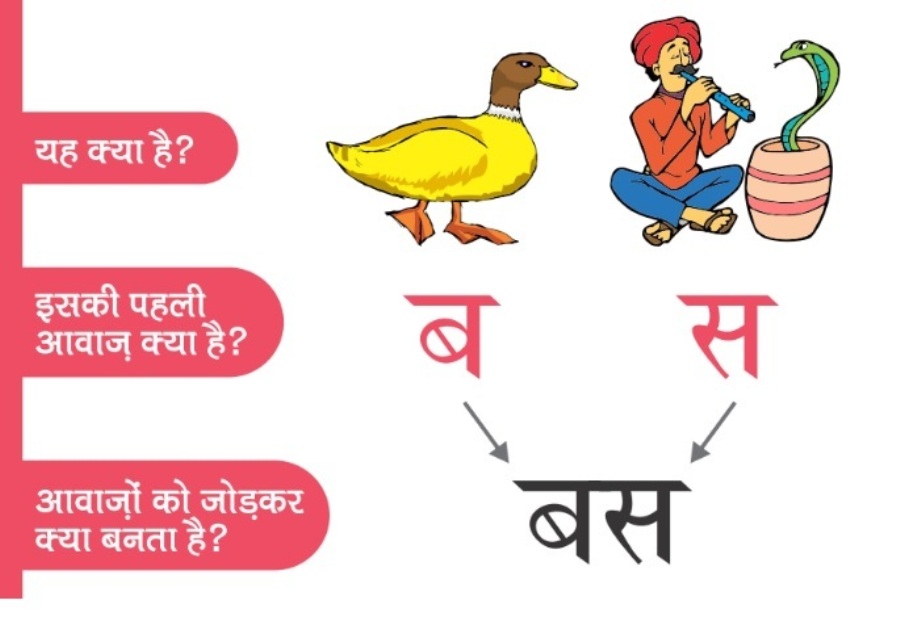 ALfA builds on these insights to flip the traditional education system upside-down. In a conventional classroom, students take months to memorise the alphabet: ‘a se anaar, aa se aam’. Instead, ALfA starts from the known. Students derive the first sounds ofpictures, for example, batakà /b/ and saperaà /s/. They then add the sounds - /b/+ /s/ makes “bas”– reading words from the first day.
ALfA builds on these insights to flip the traditional education system upside-down. In a conventional classroom, students take months to memorise the alphabet: ‘a se anaar, aa se aam’. Instead, ALfA starts from the known. Students derive the first sounds ofpictures, for example, batakà /b/ and saperaà /s/. They then add the sounds - /b/+ /s/ makes “bas”– reading words from the first day.
In maths, students use concrete objects like matchsticks (ones) and ice-cream sticks (tens) to represent numbers and solve questions. Using hands-on materials like these ensures that learning isdeeper and longer-lasting, and above all, makes mathematics interesting and fun. Children as young as four (Balvatika) are showing their understanding of four-digit numbers along with their place values!
The Power of Pairs
Research from Slavin, Palincsar, Brown, and Topping shows that 1:1 interactions help children learn. But with 40 or more kids in a classroom, it is impossible for a teacher to cater to every student’s needs individually. ALfA offers an innovative solution: children work in pairs, with one child asking questions and listening to the other read, before swapping roles. All children are engaged in learning, no one is left out or bored.
Instead of knowledge being transferred from teacher and textbook to student, children learn with and from each other. They challenge each other's thinking, and build knowledge together, often reaching a common understanding. This process develops key 21st-century competencies like critical thinking and creativity.
Studies on random pairing, (e.g. Damon &Phelps, 1989) show that children can learn without differentiation by ability level. Collaboration in diverse pairsenhances social skills, empathy, and academic success.This approach fosters equity, inclusion, valuing diverse perspectives, and a growth mindset.
Numbers Talk
‘It sounds good, but does it really work in practice?’ some may be wondering. The great news is that, beyond photos and videos, there is hard evidence that ALfA is boosting learning.
Harvard Graduate School of Education wrote up the results from the first pilot, conducted in 10 schools of Shamli district. They found effect sizes of 0.23 for Grade 3 students and a whopping 0.89 for Grade 5 students, results that suggest ‘significant value in pursuing the ALfA model’. Across different districts, students’ rate of learning has doubled compared to traditional schooling.
Beyond third-party testing, the government’s own exam results tell a remarkable story. Shamli scored 36% in the NIPUN Assessment Test, well above the state average. Hilauli achieved a whopping 47%.
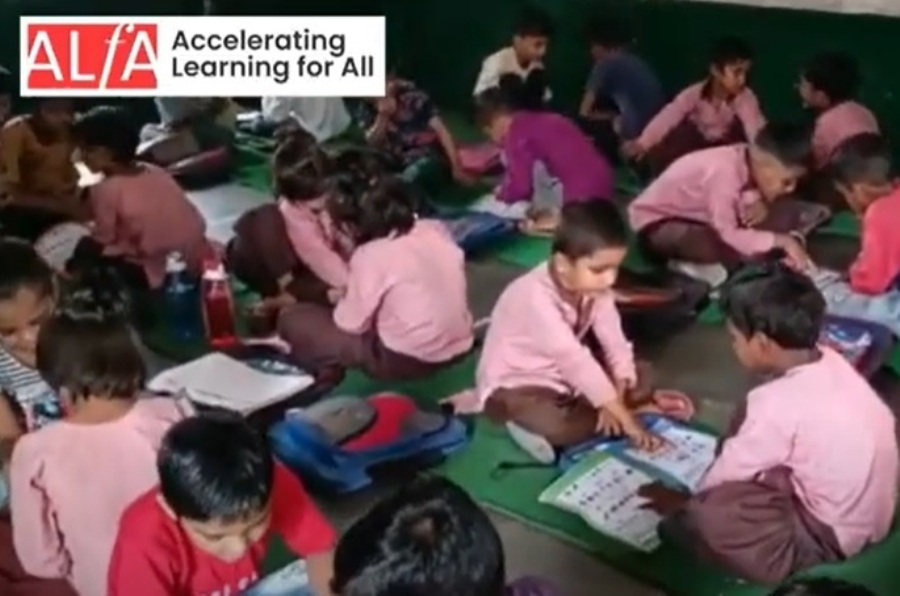 Appreciated by Teachers and Policymakers
Appreciated by Teachers and Policymakers
ALfA has helped a lot, according to Nitin Kumar, a Shamli teacher: ‘When we explain things to the children, it takes time for them to understand. But when they are learning from each other, it is much easier.’ Teachers are delighted when they see the swift results. Classroom attendance also increases when children have fun, according to the then Basic Shiksha Adhikari, Rahul Mishra in an interview with a news outlet, the Print.
Policymakers have noticed ALfA’s potential to play a major part in efforts to reach NIPUN goals by 2026/27. Speaking at a training of teachers from 580 schools in Lucknow, Dr MK Sundaram, the Principal Secretary for Education, remarked that he was hopeful to implement ALfA in at least 1 lakh schools of UPgoing forward.
An Educational Renaissance
Every single child who doesn’t learn to read represents a tragic loss of potential, curtailing future health, social, and economic prospects both for them individually and for us as a nation. There is no time to waste on traditional, teacher-centred, rote-learning methods, which take years to achieve basic goals.
Note: In alignment with their mission to make India NIPUN by 2026, DEVI Sansthan has announced Synergy Summit 3.0, which will take place from September 23rd to 25th in Lucknow. The event is set to be India's largest Foundational Literacy and Numeracy fair which will be inaugurated by Shri Rajnath Singh, Honorable Minister of Defence and attended by Uttar Pradesh Chief Minister Yogi Adityanath besides many other dignitaries and corporates. CSR foundations, NGOs, schools & colleges interested in partnering with DEVI Sansthan to scale up ALfA or interested to learn more can join the Synergy Summit 3.0 in person (Lucknow) or online.




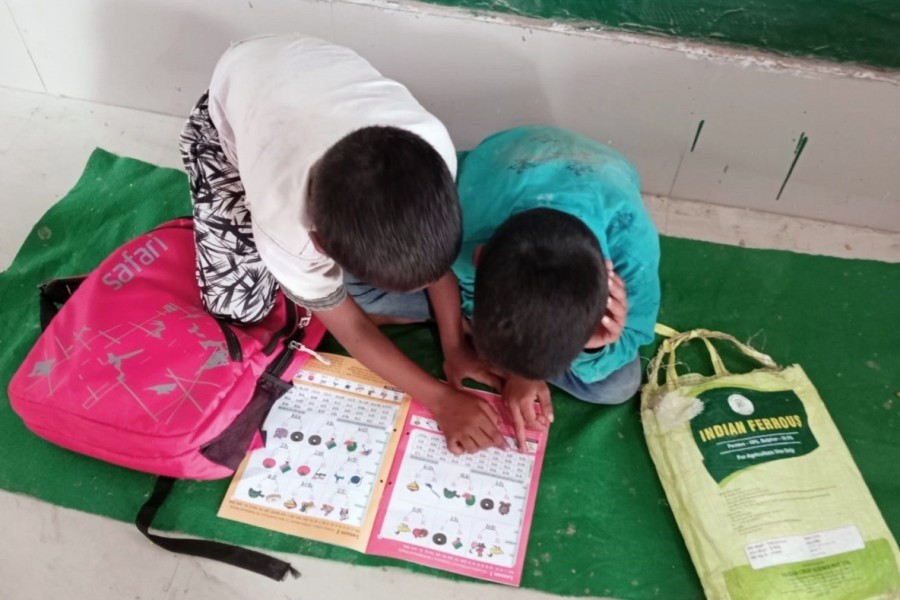
 Quality education and effective learning are fundamental to unlocking a child's potential and shaping a prosperous future for society. Dr. Sunita Gandhi, Founder of Dignity Education Vision International (DEVI), a not-for-profit organization committed to transforming education, delves into this critical issue in her article "Literacy in 45 Days? How a new FLN program is accelerating learning for all in Uttar Pradesh." She explores the remarkable success of the Accelerating Learning for All (ALfA) program, implemented in the Hilauli block of Uttar Pradesh, which has dramatically improved literacy rates in a short period. Drawing from her extensive experience and research, Dr. Gandhi highlights the innovative teaching methodologies and the significant impact of peer learning, demonstrating how ALfA's approach can revolutionize education and meet the ambitious NIPUN targets.
Quality education and effective learning are fundamental to unlocking a child's potential and shaping a prosperous future for society. Dr. Sunita Gandhi, Founder of Dignity Education Vision International (DEVI), a not-for-profit organization committed to transforming education, delves into this critical issue in her article "Literacy in 45 Days? How a new FLN program is accelerating learning for all in Uttar Pradesh." She explores the remarkable success of the Accelerating Learning for All (ALfA) program, implemented in the Hilauli block of Uttar Pradesh, which has dramatically improved literacy rates in a short period. Drawing from her extensive experience and research, Dr. Gandhi highlights the innovative teaching methodologies and the significant impact of peer learning, demonstrating how ALfA's approach can revolutionize education and meet the ambitious NIPUN targets. At the end of 2023, the government of Uttar Pradesh conducted the NIPUN Assessment Test across 64,000 schools, measuring the reading, writing, and arithmetic skills of more than 2 million Grade 1-3 students. Across the state, just 24% of schools were deemed to have met NIPUN targets. In Unnao district, the results were even more concerning, with only 15% of schools passing the benchmark. Yet one block, Hilauli, achieved an outstanding result: 47%, triple the Unnao district’s average.
At the end of 2023, the government of Uttar Pradesh conducted the NIPUN Assessment Test across 64,000 schools, measuring the reading, writing, and arithmetic skills of more than 2 million Grade 1-3 students. Across the state, just 24% of schools were deemed to have met NIPUN targets. In Unnao district, the results were even more concerning, with only 15% of schools passing the benchmark. Yet one block, Hilauli, achieved an outstanding result: 47%, triple the Unnao district’s average. ALfA builds on these insights to flip the traditional education system upside-down. In a conventional classroom, students take months to memorise the alphabet: ‘a se anaar, aa se aam’. Instead, ALfA starts from the known. Students derive the first sounds ofpictures, for example, batakà /b/ and saperaà /s/. They then add the sounds - /b/+ /s/ makes “bas”– reading words from the first day.
ALfA builds on these insights to flip the traditional education system upside-down. In a conventional classroom, students take months to memorise the alphabet: ‘a se anaar, aa se aam’. Instead, ALfA starts from the known. Students derive the first sounds ofpictures, for example, batakà /b/ and saperaà /s/. They then add the sounds - /b/+ /s/ makes “bas”– reading words from the first day. Appreciated by Teachers and Policymakers
Appreciated by Teachers and Policymakers


.jpg)










